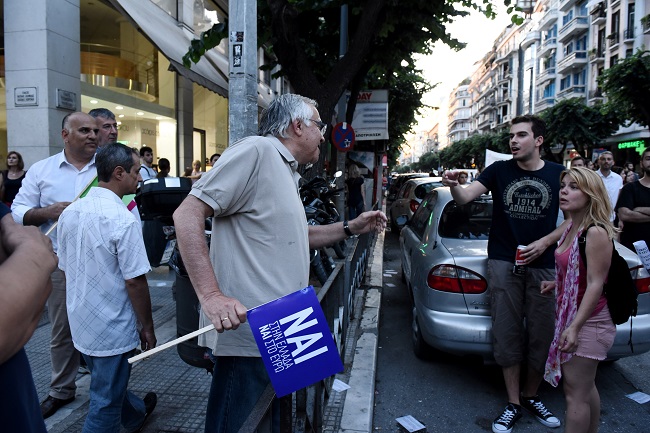
A demonstrator, left, supporting the yes vote argues with a couple supporting the no vote in the northern Greek port city of Thessaloniki, Thursday, July 2, 2015. The battle for Greek votes entered full swing Thursday ahead of a crucial weekend referendum that could decide whether the country falls out of the euro. AP
ATHENS, Greece — Greeks were voting Sunday in a critical bailout referendum, with opinion polls showing people evenly split on whether to accept creditors’ proposals for more austerity in exchange for rescue loans, or defiantly reject the deal.
Greek Prime Minister Alexis Tsipras is gambling the future of his 5-month-old left-wing government on the quick poll — insisting that a “no” vote would strengthen his hand to negotiate a better deal with the country’s creditors and saying “yes” would mean capitulating to their harsh demands.
The opposition accuses Tsipras of jeopardizing the country’s membership in the 19-nation club that uses the euro and says a “yes” vote is about keeping the common currency.
Tsipras’ high-stakes standoff with lenders— the European Union and the International Monetary Fund — resulted in Greece defaulting on its debts this past week and shutting down banks to avoid their collapse. The debt-wracked nation also lost access to billions of euros after an existing bailout deal expired.
Nikolaos Papadopoulos, a voter in Athens, said he cast a “yes” ballot.
“I believe in a democracy, in a united Europe, in a world with a good economy, and I want us all to work together to move forward and not to be retrogressive,” he said.
Another Athens voter, Ioannis Nikolaou, disagreed.
“I voted for Tsipras and want to vote ‘no’ because I’ve lived in Europe and know what rights Europeans and Greeks have. For that reason alone. They don’t have the same rights,” he said.
The sense of urgency was palpable all week as Greeks struggled to decipher a convoluted referendum question while being bombarded with frenzied messages of impending doom or defiance. The weeklong campaign was fought amid a banking crisis in which cash withdrawals were restricted to 60 euros ($67) per day, large queues formed at ATMs and the few bank branches that did open to help retirees without bank cards were mobbed.
Polls published Friday showed the two sides in a dead heat and an overwhelming majority of people — about 75 percent — who wanted Greece to remain in the euro currency.
“Today, we Greeks decide on the fate of our country,” conservative opposition leader Antonis Samaras said as he cast his ballot. “We vote ‘yes’ to Greece. We vote ‘yes’ to Europe.”
No matter the referendum result, Tsipras faces a tough road ahead, fraught with uncertainty about whether he will be able to deliver an improved bailout agreement.
Yale University political science professor Stathis Kalyvas said the Greek government will face daunting challenges no matter which way the vote goes. In case of a “no” win, Kalyvas said the Greek government could be confronted with the refusal of other eurozone countries to negotiate a better deal because of their distrust of Tsipras.
A “yes” win won’t mean a road to the negotiating table strewn with roses either, but would likely usher in a new government with a shot at negotiating an improved deal, Kalyvas said.
He said if the European Union wants to keep Greece in the eurozone, it will have to come up with “a very generous plan” since the cost of the crisis has shot up to unanticipated levels.
German Finance Minister Wolfgang Schaeuble agreed, telling the daily Bild paper that future negotiations between Greece and its creditors will be “very difficult,” because the country’s economic situation has worsened dramatically in recent weeks. Schaeuble repeated the German position that for Europe to work, all countries need to abide by the rules.
Another problem with any future debt negotiations is that Greece’s creditors do not agree among themselves. The International Monetary Fund has said it will not get involved in a third bailout unless it includes substantive debt relief for Greece. Other European nations, however, have ruled out debt relief until Greece makes more financial reforms.
Greek Finance Minister Yianis Varoufakis, meanwhile launched a salvo at other euro nations, accusing them of holding out on a bailout deal to allow Greece’s bank coffers to run dry so they could force Greece to accept what he called a humiliating deal.
Writing in the daily Kathimerini, Varoufakis said accepting the creditors’ terms would be a “permanent condemnation” while rejecting it would offer the “only prospect for recovery.”
Varoufakis says banks will reopen Tuesday whatever the referendum’s outcome. But that’s unlikely to happen unless the European Central Bank agrees to increase the credit to Greek banks.
With speculation swirling on the referendum’s impact, Greece’s Deputy Prime Minister Yiannis Dragasakis denied media reports that he would be picked to lead a new “grand coalition” government.
“The country has a prime minister who will have an even stronger popular mandate and support. I will serve this mandate on my part,” he said.